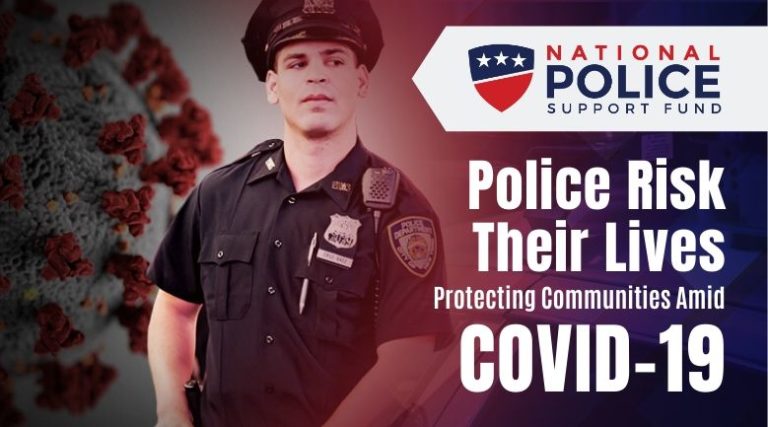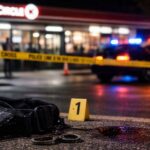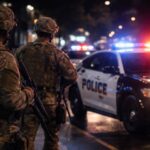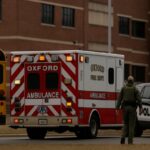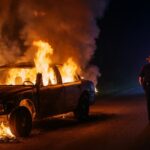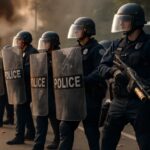While many people in the U.S. are working from home, police officers are on the front lines of keeping their communities safe as COVID-19 continues to spread. Over the past few weeks, more officers have tested positive for the virus, and some have even lost their lives because of it.
The situation also begs some longer-term questions about what happens to the rule of law and respect for police in the long term as officers are no longer able to do their jobs.
New York
New York now has more confirmed coronavirus cases than China, where the virus began, with the majority of those cases concentrated in and around New York City. As a result, the NYPD has been hit hard as its officers put themselves in the line of fire day in and day out.
As of April 1, more than 1,000 NYPD employees have tested positive for COVID-19, according to police chief Terence Monahan. In addition, another 6,100 officers — or 17% of the total police force — called out sick April 1.
The large numbers of diagnosed and presumed cases has gotten the attention of New York Gov. Andrew Cuomo, who said he’s worried about the potential shortage of front-line workers as the pandemic intensifies throughout New York City.
However, at the same time, Cuomo has also called on the NYPD to be out on the streets even more to enforce social distancing guidelines put in place to stop the virus from spreading.
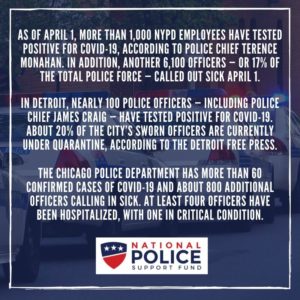
“The NYPD has to get more aggressive. Period. Period,” Cuomo said. “We’re going to need law enforcement to get more aggressive.”
As Cuomo asks the city’s police force to be out on the front lines, officers are saying they do not have the proper protective equipment to do so.
“No matter how this pandemic progresses, New York City police officers will remain on the front lines and will continue to carry out our duties protecting New Yorkers,” PBA President Patrick Lynch said in a statement. “The NYPD has not done enough to ensure that all of our members have protective equipment such as masks and gloves, nor does it have adequate supplies of that equipment to weather a prolonged outbreak.”
Both Cuomo and New York City Mayor Bill de Blasio have vowed to make sure that the NYPD is taken care of during this important time so officers can continue to enforce social distancing without putting themselves in harm’s way.
Detroit
In Detroit, nearly 100 police officers — including Police Chief James Craig — have tested positive for COVID-19. About 20% of the city’s sworn officers are currently under quarantine, according to the Detroit Free Press.
In recent weeks, Detroit has bubbled up as a “hot spot” for the coronavirus because of its dense urban population and airport that brings in thousands of international travelers every day. Its officers face the same challenges as the NYPD in terms of enforcing social distancing and upholding the rule of law without proper protective equipment.
However, the spread of COVID-19 among Detroit’s police force is also linked to the Police and Pancakes fundraiser on March 3. This event brought more than 100 people together just as the virus was beginning to take hold in the U.S., including dozens of police officers.
“Certainly that was one of the early cases — one of the early cases in the area that we were made aware of, and there were a number of us that went into quarantine,” said Detroit Assistant Police Chief David LeValley.
In an effort to prevent further spread among police officers and other first responders, city officials have made new rapid response COVID-19 tests available to them. These new tests deliver results in about 15 minutes, compared to days or even weeks for traditional tests.
Mayor Mike Duggan said the city is also stepping up its tracking of symptoms among first responders.
“We put a thermometer on everyone, Detroit Police and Fire coming to work,” Duggan said. “I got two alerts this morning. We had one officer come in over 100 degrees and one firefighter who came in over 100 degrees and immediately sent them home.”
Chicago
On April 2, Chicago lost its first police officer to COVID-19. Marco Di Franco, age 50, was a highly-decorated 21-year veteran of the force who worked in the narcotics division. He contracted the virus last week and was hospitalized over the weekend.
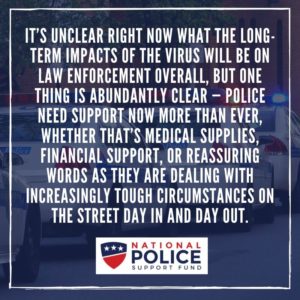
Di Franco was a first-generation Italian-American who took great pride in his work as a police officer.
“His sacrifice underscores the threats that are faced by public service employees that by their profession are not allowed to shelter in place at home,” Interim Supt. Charlie Beck said.
The Chicago Police Department has more than 60 confirmed cases of COVID-19 and about 800 additional officers calling in sick. At least four officers have been hospitalized, with one in critical condition.
Anthony Guglielmi, a spokesman for the Chicago Police Department, said in a tweet that the virus “has hit the Chicago Police Department and a dedicated family of city public servants very hard.”
Guglielmi also said the virus has not yet impacted staffing levels, but the department has what he described as a “six-layer plan” in place to continue serving the city and its residents with fewer officers on the front lines.
Long-Term Implications
The stories in New York, Detroit, and Chicago are playing out in cities across the country as police officers continually put themselves in harm’s way to keep communities safe and uphold the rule of law.
If the number of officers on the street continues to decline, some departments might need to look to unconventional measures like bringing retirees back into the force.
It’s unclear right now what the long-term impacts of the virus will be on law enforcement overall, but one thing is abundantly clear — police need support now more than ever, whether that’s medical supplies, financial support, or reassuring words as they are dealing with increasingly tough circumstances on the street day in and day out.
Police across the country are grappling with how to do their jobs in this new climate and how to stay safe when staffing and financial resources are already stretched thin. Here’s a look at how police are coping, and how you can support their work during this crucial time.

